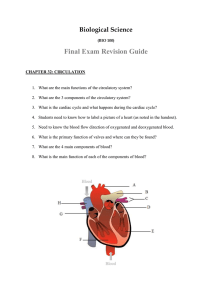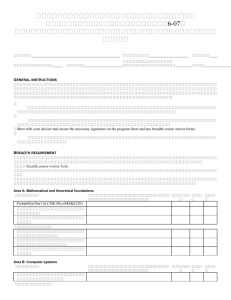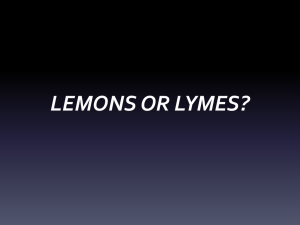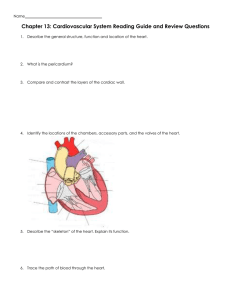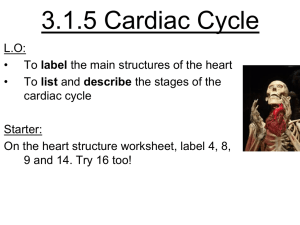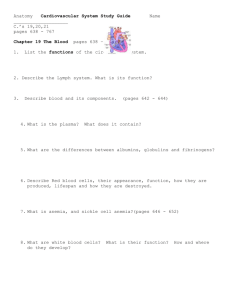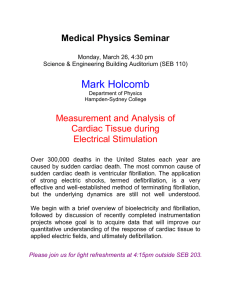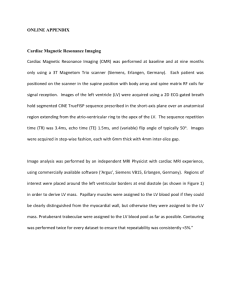Massachusetts Institute of Technology Harvard Medical School Brigham and Women’s/Massachusetts General Hosp.
advertisement
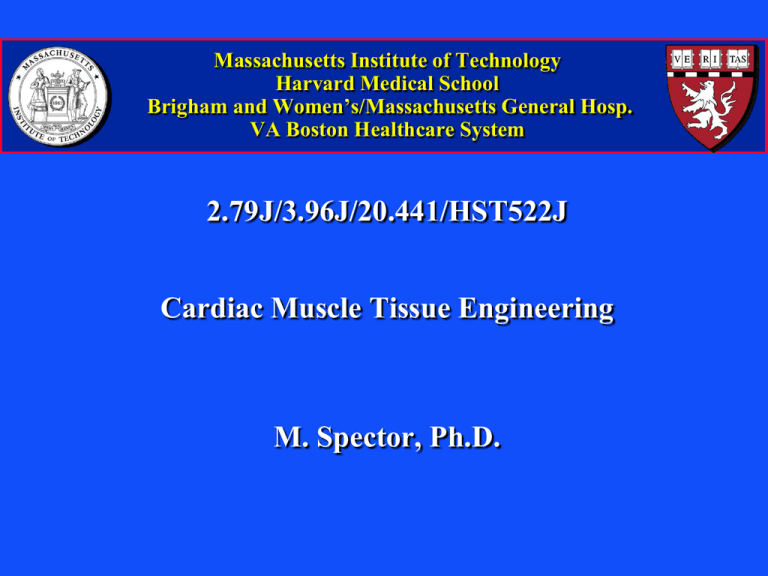
Massachusetts Institute of Technology Harvard Medical School Brigham and Women’s/Massachusetts General Hosp. VA Boston Healthcare System 2.79J/3.96J/20.441/HST522J Cardiac Muscle Tissue Engineering M. Spector, Ph.D. TISSUE ENGINEERING VS. REGENERATIVE MEDICINE* TISSUE ENGINEERING REGENERATIVE MED. Regeneration In Vitro Regeneration In Vivo Produce the fully formed Implant the biomaterial tissue in vitro by seeding matrix with, or without cells into a biomaterial seeded cells, into the body matrix, and then to facilitate regeneration implant the regenerated of the tissue in vivo. tissue into the body. Inject cells (e.g., MSCs). TISSUE ENGINEERING VS. REGENERATIVE MEDICINE TISSUE ENGINEERING Regeneration In Vitro Advantages • Evaluation of tissue prior to implantation Disadvantages • For incorporation, must be remodeling • Stress-induced architecture cannot yet be produced in vitro REGENERATIVE MED. Regeneration In Vivo Advantages • Incorporation and formation under the influence of endogenous regulators (including mechanical strains) Disadvantages • Dislodgment and degrad. by mech. stresses in vivo CARDIAC MUSCLE TISSUE ENGR./REGENERATIVE MED. • SCAFFOLD (MATRIX) – Collagen – Matrigel • CELLS – Neonatal cardiomyocytes – Mesenchymal stem cells – Embryonic stem cells • REGULATORS – Cytokines (growth factors) – Mechanical loading – Electric stimulation Which Tissues Can Regenerate Spontaneously? Yes No Connective Tissues • Bone • Articular Cartilage, Ligament, Intervertebral Disc, Others Epithelia (e.g., epidermis) √ √ √ Muscle √ • Cardiac, Skeletal • Smooth Nerve √ √ TISSUE ENGINEERING ENDPOINTS • Morphological/Histological/Biochemical • Functional – Synchronous contraction with the recipient heart • Clinical – Improved cardiac function Cardiac Anatomy Image removed due to copyright restrictions. Medical illustrations of human heart, cross-section view. K. Shu Cardiac Infarct Resulting from Coronary Artery Occlusion Image removed due to copyright restrictions. Medical illustration. Zone of infarct Functional Anatomy of the Heart Cardiomyocytes Images removed due to copyright restrictions. Neonatal rat cardiomyocytes by ICC/IF: Red: actin Green: heavy chain cardiac myosin primary antibody Blue: DAPI-labelled DNA K. Shu Cardiac Contraction • Contractile proteins: – α-cardiac actin – Myosin heavy chain (MHC) – Tropomyosin • Troponin-T • Troponin-I • Troponin-C – Connexin-43 – Titin (connectin) Figure by MIT OpenCourseWare. K. Shu Biodegradable polyester urethane urea Infarct Control, 8 wks car 500 μm atch 55 mm Courtesy of Elsevier, Inc., http://www.sciencedirect.com. Used with permission. Implant, 0.3 mm thick Implant, 8 wks KL Fujimoto, et al., J Am Coll Cardiol 49:2292;2007 200 μm Infarct Control, 8 wks 500 μm Implant, 8 wks Courtesy of Elsevier, Inc., http://www.sciencedirect.com. Used with permission. • • • • • Black arrows indicate the top of the PEUU implanted area. α-SMA staining appears green CD31 staining appears red Nuclear staining appears blue Increased smooth muscle actin is apparent in the PEUU patched group KL Fujimoto, et al., J Am Coll Cardiol 49:2292;2007 Echocardiography Courtesy of Elsevier, Inc., http://www.sciencedirect.com. Used with permission. KL Fujimoto, et al., J Am Coll Cardiol 49:2292;2007 • Hypotheses - To engineer myocardium, biophysical regulation of the cells needs to recapitulate multiple signals present in the native heart. - excitation–contraction coupling, critical for the development and function of a normal heart, determines the development and function of engineered myocardium. • After only 8 days in vitro, electrical field stimulation - induced cell alignment and coupling, - increased the amplitude of synchronous construct contractions by a factor of 7, and - resulted in ultrastructural organization. Electrical stimulation for synchronous beating • Neonatal rat ventricular myocytes on Ultrafoam collagen sponges • Electrical pulses (rectangular, 2 ms, 5 V/cm, 1 Hz) for 5 days • Cardiac proteins: –connexin-43 (Cx-43) –cardiac troponin I (Tn-I) – and isoforms of myosin heavy chain (MHC) –creatine kinase-MM (CKMM) Courtesy of National Academy of Sciences, U. S. A. Used with permission. Source: Radisic, M., et al. "Functional Assembly of Engineered Myocardium by Electrical Stimulation of Cardiac Myocytes Cultured on Scaffolds." PNAS 101, no. 52 (2004): 18129-18134. Copyright (c) 2004 National Academy of Sciences, U.S.A. Electrical Stimulation for Synchronous Beating Radisic, M. PNAS 101(52): 18129-18134 (2004) Day 3: Paced contractions ofa construct cultured for 3 days without electrical Day 3: Paced contractions of a construct cultured for 3 days without electrical K. Shu Courtesy of National Academy of Sciences, U. S. A. Used with permiss ion. Source: Radisic, M., et al. "Functional assembly of engineered myocardium by electrical stimulation of cardiac myocytes cultured on scaffolds." PNAS 101 no. 52 (2004): 18129-18134. Copyright (c) 2004 National Academy of Sciences, U.S.A. Day 8: Nonstimulated; Paced contractions of a construct cultured for 8 days Day 8: Stimulated; Contractions of a construct cultured for 3 days (-) electrical stimulation and for 5 days (+) electrical stimulation. • Optimal myocardial structure and function depends not only on the cardiac myocyte fraction but also on nonmyocytes, which compose 70% of the total cell content of a heart. • While a serum-free cardiac tissue engineering approach is important with respect to future human applications, it has not been achieved because extracellular matrix from Engelbreth-Holm-Swarm tumors (also known as Matrigel) has been identified as an essential component in engineered heart tissue (EHT). • Engineered heart tissue (EHT) can be improved by using: - mixed heart cell populations - culture in defined serum-free - Matrigel-free conditions - fusion of single-unit EHTs to multi-unit heart muscle surrogates. H. Naito, et al., Circ 114:I-72 (2006) EHT Construction • Solubilized type collagen I was mixed with concentrated culture medium. • Matrigel was added. • Cells were added to the reconstitution mixture, which was mixed before casting in circular molds - inner diameter, 8 mm - outer diameter, 16 mm - height, 5 mm. • Within 3 to 7 days, EHTs coalesced to form spontaneously contracting circular structures and were transferred on automated stretch devices or flexible holders for continuous culture under chronic strain. H. Naito, et al., Circ 114:I-72 (2006) Methods and Results [Text removed due to copyright restrictions.] Conclusions [Text removed due to copyright restrictions.] H. Naito, et al., Circ 114:I-72 (2006) Slides of Figures 1, 2 and 3 removed due to copyright restrictions. MSCs and their potential as cardiac therapeutics • MSCs: readily grown in culture, retains “stemness” with many passages • Stem cells need to be functionally defined • Allogeneic MSCs: inhibit T cell proliferation, available on demand • Myogenic media containing DNAmethylating agent 5-azacytidine Pittenger, MF. Circ Res 95: 9-20 (2004). K. Shu MSCs and their potential as cardiac therapeutics • Pittenger MF (2004): – Direct injection vs. intravenous injection of MSCs – Homing ability of MSCs • Fukuda K (2001): MSCs treated with 5azacytidine – 30% of the cells formed myotube-like structures – Spontaneous beating after 2 weeks – Phenotype was similar to fetal ventricular cardiomyocytes (contractile protein genes) • Berry MF (2006): MSC injection after MI reduced the stiffness of the subsequent scar and attenuated postinfarction remodeling, preserving some cardiac function Collagen-GAG scaffolds grafted on MIs in rats • • Coronary ligation of main branch of left marginal artery for 60 min, then reperfusion Scaffolds (0.5wt% Type I collagen): 1. DHT w/o cells 2. EDAC w/o cells 3. DHT with BrdU-labeled MSCs Xiang Z. Tiss. Engr. 12(9): 2467-2478 (2006) K. Shu Collagen-GAG scaffolds grafted on MIs in rats • (A) Typical scar. • (B, C) DHT group showing blood vessels in the scarred regions • (D, E) EDAC group • (F–I) Cell–scaffold group. Courtesy of Mary Ann Liebert, Inc. Used with permission. Xiang Z. Tiss. Engr. 12(9): 2467-2478 (2006) Collagen-GAG scaffolds grafted on MIs in rats Courtesy of Mary Ann Liebert, Inc. Used with permission. – Minimum heart wall thickness (Tw) – Width of scar at the site of infarct as reflected in the minimum distance between cardiomyocytes (Dc) – Minimum thickness of the residual collagen-GAG matrix (Tm) – Relative numbers of macrophages and other mononuclear leukocytes Xiang Z. Tiss. Engr. 12(9): 2467-2478 (2006) Normal Rat Myocardial Infarct Model R. Liao, BU Infarct > 1wk, Implant > 3wks, Sacrificec Courtesy of Mary Ann Liebert, Inc. Used with permission. Sham Control, 4 weeks post-infarct CELL-SEEDED SCAFFOLDS FOR GRAFTING TO THE RAT MYOCARDIUM • Collagen-GAG scaffolds as delivery vehicles for stem cells (Z. Xiang) Courtesy of Mary Ann Liebert, Inc. Used with permission. BrdU-labeled MSCs in a collagen-GAG scaffold 50 µm •Control, no implant DHT + EDAC cross-linked DHT cross-linked type I collagenGAG implant MSC-seeded DHT crosslinked Courtesy of Mary Ann Liebert,Inc. Used with permission. • Group 4 • • MSCs seeded DHT cross-linked Z. Xiang MSCs seeded DHT cross-linked type I collagen-GAG scaffold Courtesy of Mary Ann Liebert, Inc. Used with permission. Collagen-GAG scaffolds grafted on MIs in rats Control DHT EDAC Cellscaffold Courtesy of Mary Ann Liebert, Inc. Used with permission. Xiang Z. Tiss. Engr. 12(9): 2467-2478 (2006) MIT OpenCourseWare http://ocw.mit.edu 20.441J / 2.79J / 3.96J / HST.522J Biomaterials-Tissue Interactions Fall 2009 For information about citing these materials or our Terms of Use, visit: http://ocw.mit.edu/terms.
